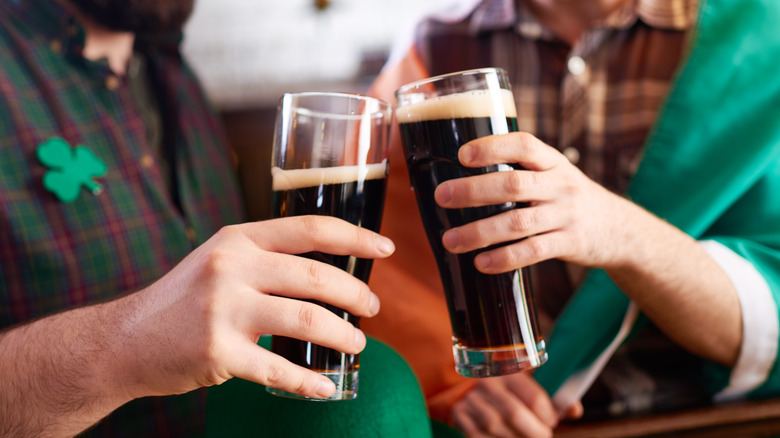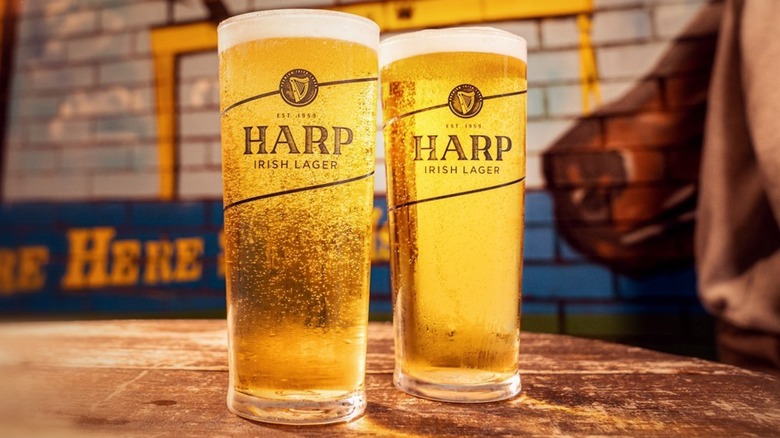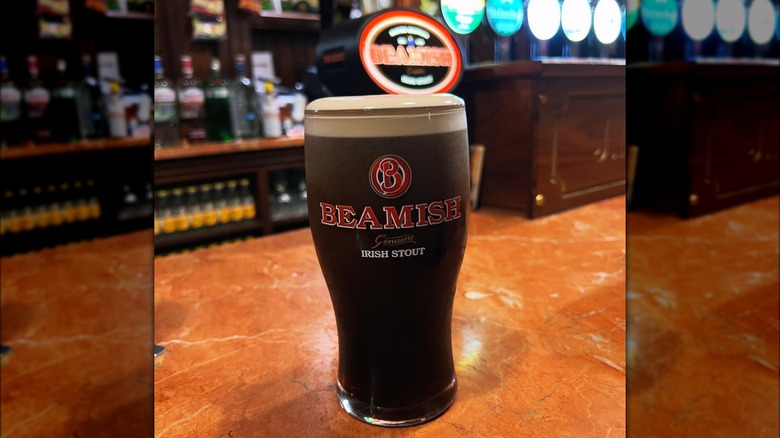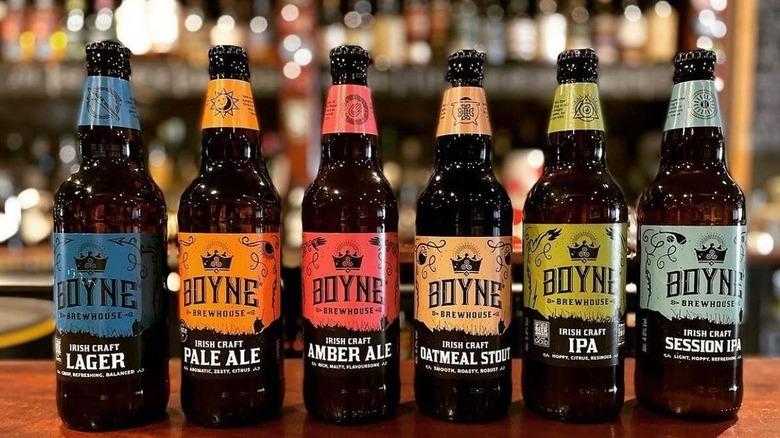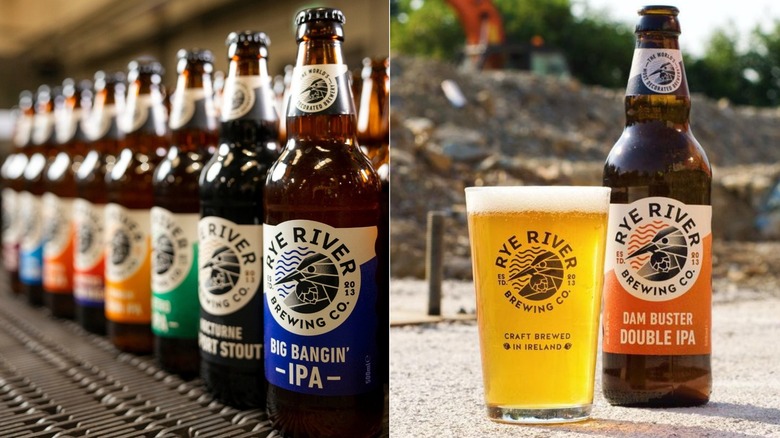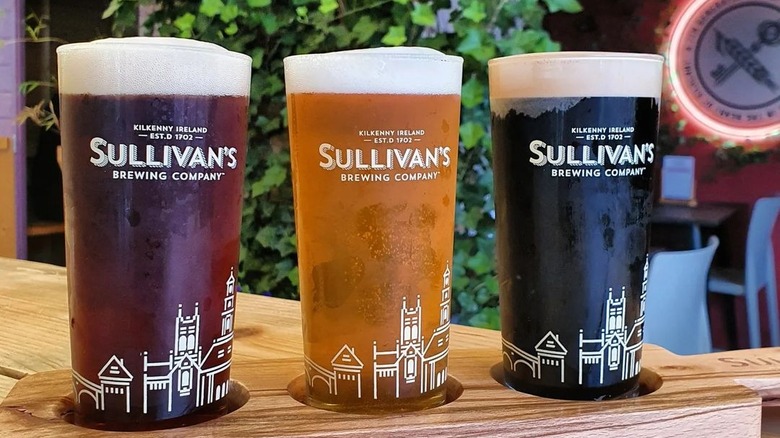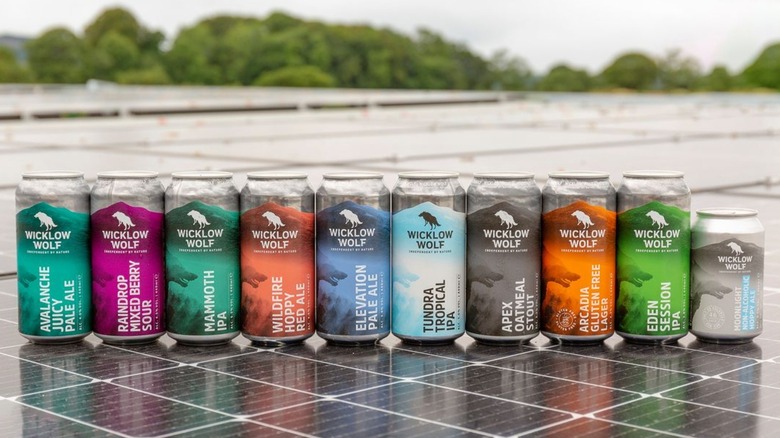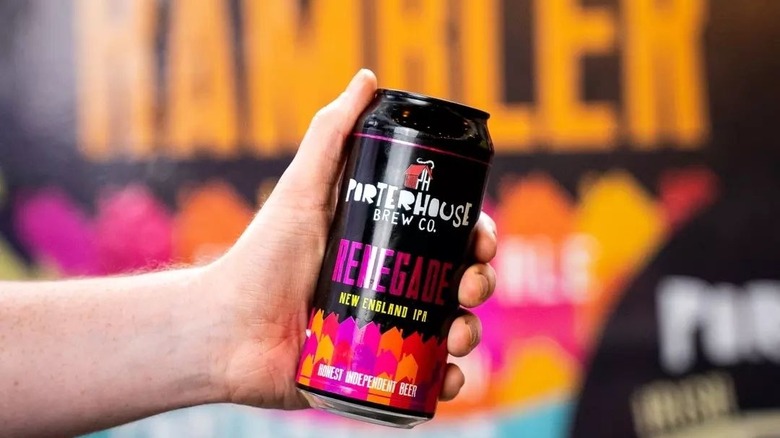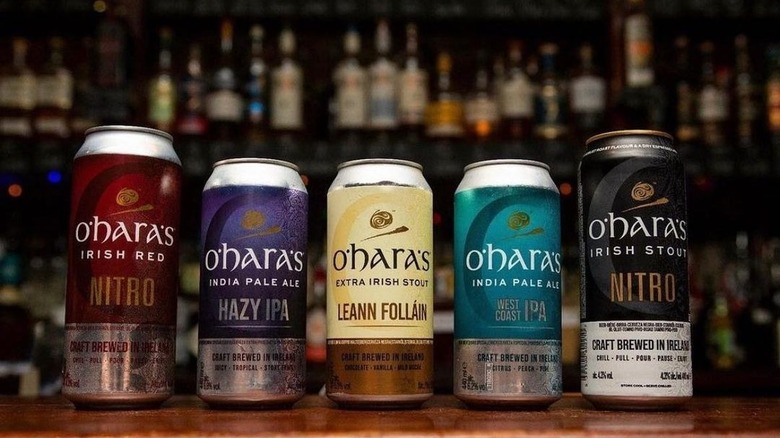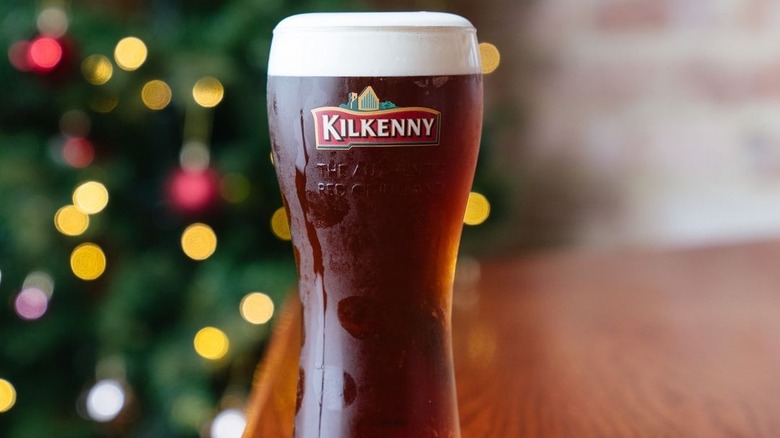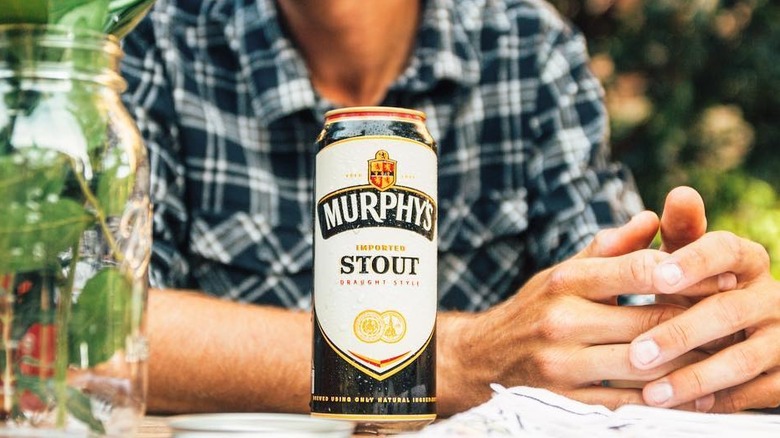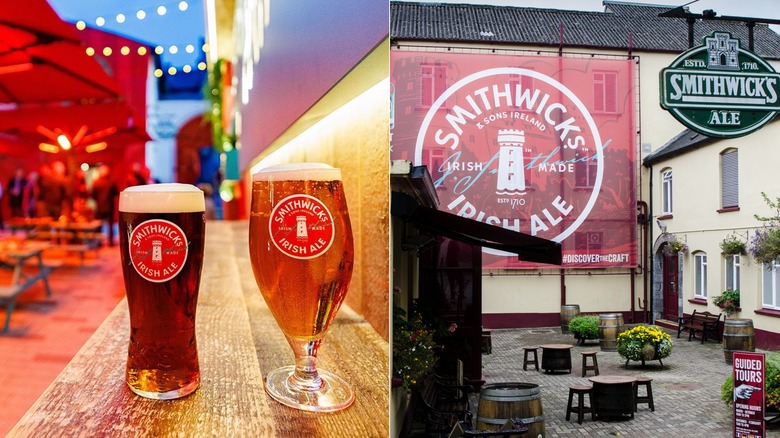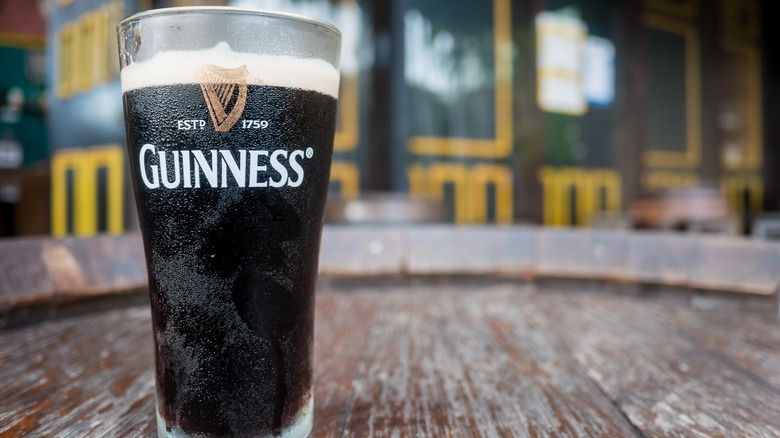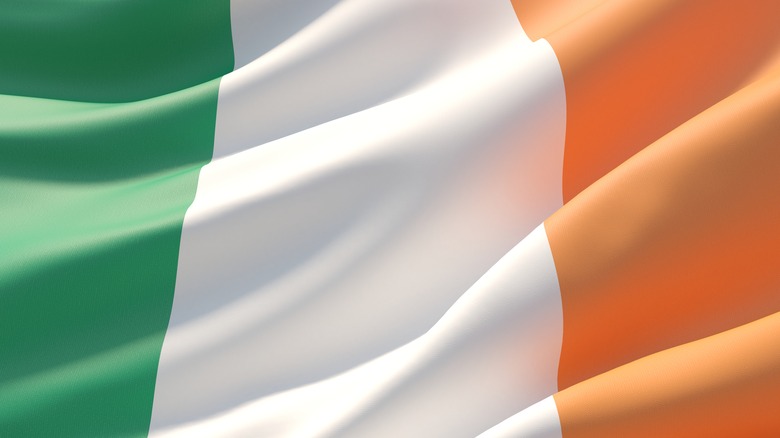9 Popular Irish Beer Brands, Ranked
Likely as far back as the Bronze Age, Ireland has been brewing beer. Over the last few centuries, the beers that have developed the country's modern beer culture were brewed in monasteries by monks — later crafted by local brewers known as alewives. No longer limited to alehouses or monasteries, the modern pursuer of the best Irish beers must turn to its brands.
Irish brewing has had a tremendous impact on beer culture around the world. Globally, it's usually not hard to find an Irish stout or red ale to sip on, and for good reason. Some of the most popular Irish beer brands are rich, satisfying, and reliably tasty. Not all brands, however, are created equal. With the boom of modern Irish craft beer, and historically significant commercial brews, which brands actually come out on top?
Having worked in marketing, sales, retail, and training in beer for many years, including in the offices of New Zeland's branch of Heineken, I know that popularity has a lot to do with what's in the glass, but even more to do with what that beer means to the drinker. This list is a compilation of the brands that rule the world of Irish beer, ranked worst to best – whether they have exceptional quality, a popular reputation, or an unbeatable legacy.
12. Harp Irish Lager
Harp Lager is an Irish beer brand that only really has one foot on Irish soil. Originally drummed up in 1959 as a lovechild between Canada's Carling-O'Keefe and Ireland's Guinness brand, Harp was designed to bridge the Atlantic and appease lager-lovers on both shores. Now, Guinness (owned by Diageo) is the full owner of the Harp brand and continues to export the beer overseas.
To the rest of the world, lager is an often overlooked style of Irish beer, but one that is certainly enjoyed by Irish pubgoers. In fact, lagers account for almost 60% of the beer sales in Ireland, with only 34.7% going to the supposed preferential style, stout, according to a 2022 market report from Drinks Ireland.
So is this the most popular beer in Ireland? Well, if you're referring to the Republic of Ireland, this lager is not actually so easy to find. In Northern Ireland, however, Harp remains a popular choice. Really, Harp is an uncomplicated lager intended to refresh. To be fair, it does achieve this goal — as a fresh, clean, and crisp lager without too much heft or hop, it goes down easily.
So why is poor old Harp Lager hanging out at the back of the line? Well, we're looking for the most popular Irish brands that best represent Irish beer and those who enjoy it, and it seems like Harp doesn't hold the same real estate in all Irish hearts as the following brands on this list.
11. Beamish
The history of Beamish is a tale of two Richards. In 1792, one Richard with the last name Beamish, and another with the last name Crawford, started the Beamish & Crawford Brewery in the grand city of Cork. The brewery's longest-lived legacy, Beamish Irish Stout is still a popular pour on taps in Ireland — although competition with Guinness and Murphy's is tough.
Today, Beamish is owned by Heineken, which has pulled the brand back to focus on Ireland's domestic market, leaving fans of the beer dry in the USA. Beamish has been fostered by many international parents over the years, including Canadian Carling O'Keefe, Australian Fosters, and Britain's Scottish & Newcastle, which was eventually purchased by Heineken in 2008. Luckily for this list, Beamish is still brewed in Cork at Heineken Ireland's brewery.
Beamish has its fans in Ireland, and indeed in the city of Cork, where the beer still represents its heritage. Known as a Cork-style stout, Beamish delivers a heavier dose of its rich chocolate malt flavor, which also layers some dark coffee notes. In the domestic market, Beamish aims to undercut the price of competing Irish stouts, which is a plus for those who prefer the Cork style of stout over Guinness' toasted barley-driven Dublin style. This also makes it a more affordable option for those looking to add an intense flavor to Irish stew.
10. Boyne Brewhouse
Boyne Brewhouse produces a solid lineup of traditional yet craft-driven styles, including pale ale, IPA, lager, APA, oatmeal stout, and amber ale. The beers that emerge from this brewery have the same generous hop influence and full-bodied malt base that you'd expect from a craft brewery on the world stage. Keeping it crafty, the brewery also offers beers for the more adventurous drinker, such as sherry cask-aged imperial stouts and double IPAs.
Originally, Boyne Brewhouse was owned independently by the Cooney family until they sold this aspect of the business to the Carlow Brewing Company in 2020. The subsequent acquisition saw the production of Boyne beers move from its original Boyne Valley spot to the County Carlow location of the new business — where O'Hara's craft beer (another brand in Carlow's portfolio and this list) is also brewed.
Public appreciation of the brand seems to have held fast in the last few years since Carlow took over the brand, and the high quality of its brews appears to have remained. That's impressive since this doesn't always happen in a brewery acquisition. Boyne Brewhouse only finds itself at number ten on this list because there happens to be some fierce craft competition in the realm of Irish beer, as well as brands that pluck the Irish harp a little louder.
9. McGargles/Rye River Brewing Co.
The name "McGargles" represents one of Ireland's proudest craft beer brands. That is, it did until 2022 when the brand was folded into the newly streamlined marketing of its mother brand, Rye River Brewing Co. But what's in a name anyway? Lovers of McGargles brews had nothing to fear as its recipes remain intact after the rebrand.
Rye River Brewing has a reputation for brewing beers of exceptional caliber. In 2021, Rye River announced that it was the world's winningest brewery for the second year in a row, based on its results at that year's World Beer Awards. McGargles' Dan's Double IPA was a country winner for the style that year and was also Ireland's most popular craft beer of 2021. The good news for hopheads is that this beer is still going strong under its new Rye River Brewing Co. name, Dam Buster Double IPA.
Rye River Brewing Co. has brew styles for all preferences with a solid core range including lagers, stouts, ales, and wheat beers, as well as a steady supply of seasonal and experimental beers. So why is this brand not sitting pretty in the number one spot? Well, the brand is popular, but that's among the crafty-minded drinkers. It's clear that Rye River's beers are exceptional, but this is a popularity contest at the end of the day, and not just among a single (if delicious) segment of the Irish beer industry.
8. Sullivan's Brewing Company
Moving one small step away from the craft table, Sullivan's beers are just a good ol' pub pint. One of many beers on this list to emerge from Kilkenny, the Sullivan's brand offers ales that go down smoothly with mates and some good craic (that just means an enjoyable time, in case you're in Kilkenny and need to blend in).
Sullivan's has three core offerings: its Black Marble stout, Maltings Irish red ale, and Irish Gold, its golden ale. The Sullivan's brand keeps a firm hold on its history, brewing in small batches with a Master Brewer from Kilkenny using as many quality local ingredients as possible. In fact, the Sullivan's Brewing Company first opened its doors in the center of Kilkenny town in 1702, so it has plenty of heritage from which to draw.
Sullivan's is of a breed of brewery that can often get overlooked in the battle between craft and large-scale production beer. At its core is the quality, legacy, and art of its product, but the focus remains on mastering tradition, rather than pushing the envelope. If you're seeking a tasty, true-to-style beer to wash down any number of traditional Irish dishes, look no further.
7. Wicklow Wolf
Wicklow Wolf is one of Ireland's craft offerings with its eyes to the future. Innovation and experimentation are drivers of this brand's beer range, as well as its ethos. Beer can be refreshing, but so is sustainability. Wicklow Wolf uses solar panels covering the brewery's entire roof, is mindful of waste management, and has its own hop farm to reduce emissions and the brewery's environmental impact.
But what about the actual beer? Well craft is as craft does, and Wicklow Wolf pours a lot of love into its brews. The brewery produces a range of common styles with the craft dial cranked up, including several styles of IPA and pale ale, with gluten-free and non-alcoholic beers for extra points. Sour beers also have a place in Wicklow Wolf's core pack, as does an oatmeal stout and a hoppy red ale to keep it Irish. The brewery's "Locavore Project" generates new seasonal brews that draw inspiration and indeed flavor from surrounding Wicklow.
So what does this all mean in terms of popularity among Irish beer brands? Well, all of these attractive features and the quality and innovation of the brews seem to satisfy and delight many lovers of Irish craft brews. In particular, the dedication that the brewery shows to representing its regional Irish home also goes a long way toward Wicklow Wolf's position on this list.
6. Porterhouse Brewing Company
In 1996, cousins Liam LaHart and Oliver Hughes opened Dublin's first brewpub, Porterhouse in Temple Bar, a craft-focussed venture that would become one of Ireland's most stand-out breweries. Today, its original family of ales, stouts, and lagers remain available, if marginally altered.
The brand well and truly thrives in the modern beer scene, and its line-up reflects this era's popular styles of beer, including a double IPA, barrel-aged stout, New England IPA, and a chocolate truffle stout. Straddling the divide between well-executed traditional styles of stout, ale, lager, and experimental projects positions this brewery well to impress beer drinkers with either preference.
Just two years after opening, the brewery's Plain Porter earned the 1998 title of Best Stout in the World at the Brewing Industry International Awards, firing a flair into the sky proclaiming that Porthouse Brewing Company was one of Ireland's highest caliber breweries. Over 20 years later, in the Independent Craft Brewers of Ireland's beer festival and its Beer of the Year competition, Porthouse Brewing's Around the Clock Imperial Stout took the top spot.
This beer brand has reputation and history while representing both modern and traditional Irish beer tastes and remaining vehemently independent. If you're a lover of Irish beer and live in Manhattan, London, or Dublin, there's a Porterhouse Brewing Company bar where you can wet your whistle.
5. O'Hara's
O'Hara's beers, brewed at the Carlow Brewing Company, are another independent commercial player that takes the spirit of craft beer and focuses it on perfecting traditional styles of beer. O'Hara's doesn't just limit itself to the stouts and ales, however, not by a long shot.
This brewery also flaunts a substantial range of popular beers in more contemporary styles. Double, tropical, session, West Coast, hazy, the list of IPA types will surely take over the rest of this article if we include them all. For the truest connoisseurs, O'Hara's produces an ultra-premium whiskey barrel-aged series, artfully crafted and kept under cork (the bottle stopper, not the county).
But that's just the crafty end of the line. What earns O'Hara's a place in the hearts of Irish beer fans, and indeed on this list, is how this translates to its craft-minded execution of traditional style beers. The iconic creamy-headed stout of Ireland is represented proudly in O'Hara's core range, as is its Irish red ale and a lager, wheat, extra stout, and pale ale.
These are the beers you want to settle into — that reward you with the first sip and keep on going with more. O'Hara's traditional beers are robust and kissed with just enough hop to perk up the characteristics of its malt base. As a beer brand, O'Hara's does it all, and it does it well.
4. Kilkenny
As its namesake, Kilkenny has become the international poster child of one of Ireland's famous brewing cities. Rather than relate to a family of beer styles under one name, Kilkenny is just one beer — a red Irish cream ale (or an Irish red ale, depending on who you ask). For many outside of Ireland, this is their first exposure to a smooth, malty Irish ale, and is a common companion to Guinness on taps in their home countries.
Kilkenny features the same velvety nitrogenated head as Guinness and goes down just as smoothly. The beer itself is malty with caramel and biscuit notes making for an unchallenging drop. Hop influence in Kilkenny is subtle, stepping back to let the beer's malt base drive its toasted barley flavor. Kilkenny's color makes it identifiable from across the pub, with its rich ruby hue and white foam head. The beer is now actually brewed by Guinness at its St. James's Gate Dublin brewery under the overarching ownership of Diageo.
Kilkenny takes this position in the list not because it's necessarily superior to any of the preceding beers, but for its iconic status and international popularity as an Irish beer. Australia and Canada are substantial markets for Kilkenny and fans in these countries get to enjoy this pint-sized piece of Ireland.
3. Murphy's
There is one contender for Guinness' title as the world's favorite Irish stout, and that beer is Murphy's. Whether domestically, or in pubs around the world, the popularity battle between Murphy's Irish stout and Guinness rages on as the brand's merchandise manifests in Heineken-contracted pubs every year on St. Patrick's Day. In 1856, James J. Murphy and his brothers founded the Lady's Well Brewery in the city of Cork and would go on to release Murphy's Stout. In 1983, Murphy's was purchased in its entirety by Heineken. Today, Heineken's Irish headquarters still operate from Lady's Well Brewery's Malthouse.
Staying true to the Cork style of Irish stout, Murphy's offers up stronger coffee and chocolate notes than its Dublin rival Guinness. It's also notably sweeter and a touch more approachable to those with aversions to hops. In the glass, Murphy's looks just how we like an Irish stout to — pitch black with a creamy white nitrogenated head. Murphy's also produces an Irish red ale, again giving Guinness a run for its money by competing with Kilkenny. Murphy's Irish Red rivals Kilkenny aptly with its smooth texture and full-bodied creamy mouthfeel with a sweet and toasty malt base, but with bright and fruity hops to balance the brew with a touch of bitterness.
2. Smithwick's Irish Ale
Smithwick's is another Kilkenny beer brand that carries serious weight. This is another Irish brewery now owned by Diageo, and production of its beer shifted to Guinness' St. James's Gate brewery in Dublin in 2013. Before this, Smithwick's was brewed on the Kilkenny site of the St. Francis Abbey where brewing had been carried out by monks for centuries. When John Smithwick founded his brewery in 1710 on this site, he would spark a beer legacy that would remain one of Ireland's fiercest even today.
Claiming to produce Ireland's most popular ale, this brewery puts out both a red ale and a pale ale. Smithwick's Red Ale is rich and malty while achieving a rewarding balance of hop bitterness that still lets the roasty caramel flavors pop in the glass. This isn't a beer that blows your hair back with flavor, but one that satisfies with every sip and has you picking up (and refilling) your glass again and again. Smithwick's Pale Ale is lighter and less malty than its ruby sibling, with a bright golden hue and more hop-forward fruitiness.
The Smithwick's brand claims the penultimate spot on this list because of its long-lived popularity in Ireland's historied beerscape. It not only represents Ireland and the city of Kilkenny (if now more in spirit than in production) but maintains legendary status among its Irish beer fans.
1. Guinness
Finally, the top spot. We'd like to say it was a surprise who'd claim the title of most popular brand, but in this case, the winner is black and white. No other Irish beer brand can come close (and many have tried) to matching the cachet, global appreciation, and iconic status of Guinness. Forgetting the beer category for a second, in 2023 Guinness was the world's highest-valued Irish brand, with no other beer brands appearing in the top ten, per Brand Finance's report.
The beer itself showcases what a Dublin-style stout is all about with its quintessential roasted barley flavor and a touch more bitterness than the likes of Cork cousin Murphy's. There are distinct notes of coffee and dark chocolate, but these manifest as less sweet than Murphy's more milk chocolate notes. Guinness brewers use flaked barley to enhance the beer's mouthfeel, texture, and the pint's famous foamy head. Despite the stout's richness, it still drinks smoothly without a heavy viscosity that might otherwise hinder its sessionability. It starts delectable and stays that way, pint after pint.
Guinness has even released a zero alcohol version, as well as lager, blonde, and special edition stouts such as Foreign Extra Stout, Nitro Cold Brew Coffee Beer, Guinness Smooth, and others. While these additions are intriguing and push the brand further, the popularity of a pint of traditional Guinness remains unmatched.
Methodology
To honor the category of "popular beer brands," this list started as a line-up of Irish-brewed brands that people, including the author, get excited to see on tap or in the fridge. The ranking element came into play by carefully answering a range of questions, including — How popular is it among the average international and Irish beer-lover? What sort of legacy does the brand carry? How good is the perceived value? And how high is the actual quality of the beer?
All the beers comprising a brand are like a family and, when ranking them, all siblings must be considered whether they outshine or hide behind their siblings. The author's opinion (and that of his Irish mates) as well as his experience in beer have played a significant part in the selection and ranking on this list. Where beer brands weren't known first-hand, product reviews, ratings, awards, and trade publications helped to find them a place on the list that made the most sense.
